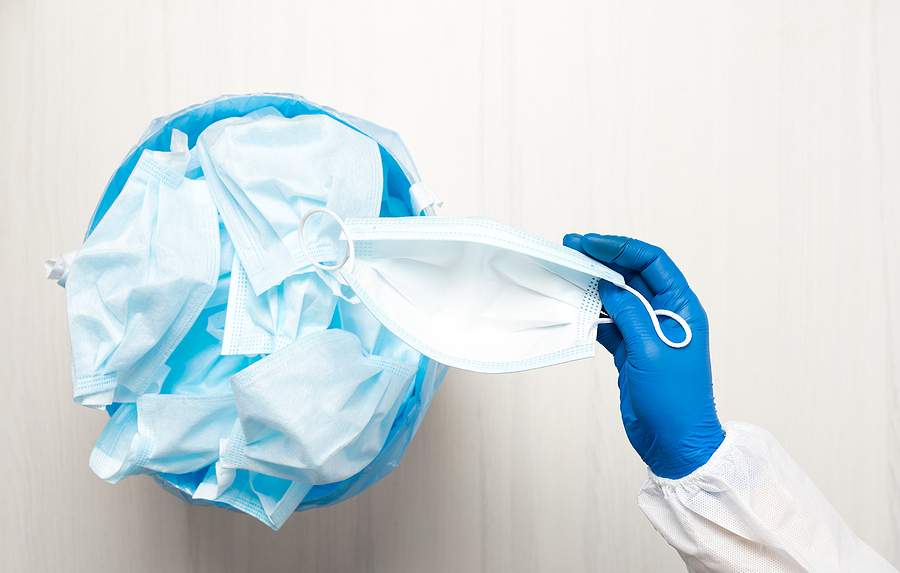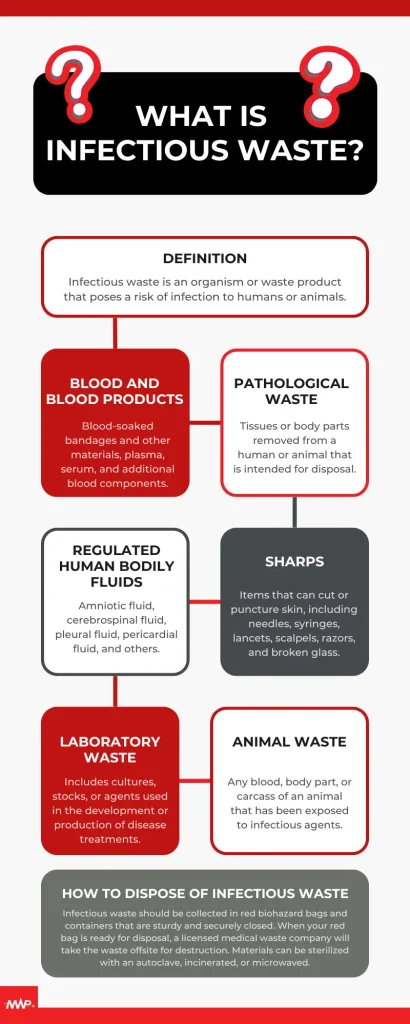What is Infectious Waste?

Infectious waste, often referred to as biohazardous waste, encompasses materials generated during medical, dental, or veterinary procedures that pose a potential risk of infection to humans, animals or the environment. This type of waste includes contaminated sharps, laboratory cultures, blood-soaked bandages, and other items that have been exposed to infectious agents. Proper identification, handling and disposal of infectious waste are critical to preventing the spread of diseases and protecting public health. Therefore, it is an essential topic for both healthcare professionals and the general public to understand. In this blog, we’ll explore what constitutes infectious medical waste and the risks associated with improper handling. In addition, learn the best practices for its safe use and effective disposal.
Defining Infectious Medical Waste

Infectious waste is an organism or waste product that poses a risk of infection to humans or animals. Healthcare workers get exposure often. This type of waste includes:
- Blood and blood products: Includes blood-soaked bandages and other materials, plasma, serum, and additional blood components.
- Pathological waste: Tissues or body parts removed from a human or animal that is intended for disposal.
- Regulated human bodily fluids: Includes amniotic fluid, cerebrospinal fluid, pleural fluid, pericardial fluid, and others. It also includes solid items soaked with bodily fluids.
- Sharps: Items that can cut or puncture skin; including needles, syringes, lancets, scalpels, razors, and broken glass.
- Laboratory waste: Includes cultures, stocks, or agents used in the development of disease treatments or the production of biological agents that may be hazardous to humans.
- Animal waste: Any blood, body part, or carcass of an animal that has been exposed to infectious agents during scientific or medical research.
How to Manage Infectious Waste
The Occupational Safety and Health Administration (OSHA) enforces the Bloodborne Pathogens Standard to protect workers that may be exposed to blood and other potentially infectious materials. The Standard requires employers to implement an exposure control plan that details protection measures for identifying, handling, and disposing of biohazardous materials.
Above all, biohazardous waste should always be handled with the use of appropriate personal protective equipment (PPE). This includes gloves, gowns, eye protection, and masks. Labels and signs should clearly communicate hazards by being affixed to containers, refrigerators, and freezers. Furthermore, employees should receive annual training on bloodborne pathogens and methods to control disease exposure. A post-exposure plan should also be in place in the event that an exposure incident occurs.
How to Dispose of Infectious Waste
Measures for discarding infectious medical waste items are designed to protect healthcare workers, patients, and those who manage waste through disposal. Biohazardous and potentially infectious waste is also known as red bag waste. Red bags are easily identified and help avoid improper handling. Infectious waste should be collected in red biohazard bags and containers that are sturdy and securely closed.
When your red bag waste is ready for disposal a licensed medical waste company will take the waste offsite for destruction. Your service provider will dispose if it using an autoclave (steam sterilization), incineration, or microwaving. However, it will depend on the types of waste. After treating the infectious waste, the company takes it to a landfill or further incinerates it.
Safely Dispose of Your Practice’s Biomedical Waste with Medical Waste Pros
At Medical Waste Pros, we understand the critical role that proper biohazardous waste management plays in protecting public health and the environment. We are committed to providing safe, efficient, and compliant waste disposal solutions in the US. Call us at (888) 755-6370 or fill out the form. You’ll receive free quotes on our medical waste disposal services in minutes.










